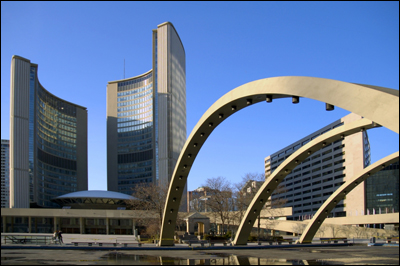
News Release
January 28, 2011
Creative Capital Initiative to update Toronto’s Culture Plan
Toronto will take a fresh look at its official Culture Plan with the help of a blue ribbon panel, Councillor Michael Thompson (Ward 37 Scarborough Centre), Chair of the City’s Economic Development Committee, announced today.
The Creative Capital Initiative, a partnership between the City and the arts and culture community, will provide expert advice and recommendations to update the City’s 2003 Culture Plan for the new term of Council.
“Toronto’s cultural sector employs nearly 133,000 people and annually generates $9 billion in GDP,” Councillor Thompson said. “Between 1991 and 2007, creative occupations grew at more than twice the rate of the general labour force. Given the changes that have occurred in the economy, Toronto’s city governance philosophy and the city’s cultural sector since 2003, it is time to take a fresh look at our Culture Plan.”
The Creative Capital Initiative will look for ways to enhance Toronto’s role as an international cultural centre, and recommend actions to amplify the sector’s economic and social contributions.
Co-chairing the initiative are three prominent members of Canada’s business and cultural communities: Robert Foster (CEO Capital Canada), Karen Kain (Artistic Director of the National Ballet of Canada), and former federal Cabinet Minister Jim Prentice (Vice-Chairman, CIBC). They are joined by an Advisory Council that includes Nichole Anderson (President and CEO, Business for the Arts), Cameron Bailey (Co-Director, Toronto International Film Festival Group), Claire Hopkinson (Executive Director, Toronto Arts Council), Che Kothari (Executive Director, Manifesto Community Arts) and Gail Lord (Principal, Lord Cultural Resources).
The Creative Capital Initiative will be advised by Richard Florida (Director of the Martin Prosperity Institute) and Jeff Melanson (Special Advisor to the Mayor – Arts and Culture).
The initiative will hold a series of focus groups with invited members of Toronto’s cultural and business communities beginning in February. Three public consultations are also planned. The initiative will present its recommendations to the Economic Development Committee at the committee’s May 2011 meeting.
The 2003 Culture Plan recognizes that great cities of the world are all creative cities whose citizens work with ideas, are intensely mobile and insist on a high quality of life. Since its adoption, the Culture Plan has successfully shaped the City’s cultural strategy and supported the growth of the cultural sector. To date, 87 per cent of the Culture Plan’s 63 recommendations have been implemented. In August 2010, Council reaffirmed its commitment to the Culture Plan’s cultural investment goal of $25 per capita (currently at $18 per capita).
For information about the Culture Plan, visit http://www.toronto.ca/culture/cultureplan.htm.
The public is invited to track progress of the Creative Capital Initiative and provide comments on http://www.livewithculture.ca.
Toronto is Canada’s largest city and sixth largest government, and home to a diverse population of about 2.6 million people. Toronto’s government is dedicated to delivering customer service excellence, creating a transparent and accountable government, reducing the size and cost of government and building a transportation city. For information on non-emergency City services and programs, Toronto residents, businesses and visitors can dial 311, 24 hours a day, 7 days a week.
You may also like:
